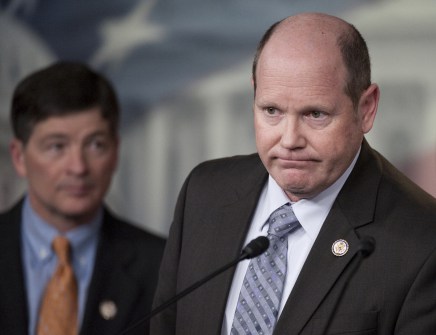What One House GOP Retirement May Say About the Future

At first glance, the Reid Ribble retirement doesn’t appear headline-worthy. Yes, he is now among 16 House Republicans, half from tea party takeover class of 2010, to announce a voluntary departure at year’s end. But, no, that retirement roster is hardly extraordinary, and it’s little surprise that a decent number of those insurgent outsiders have concluded they’ve made their mark and can move on.
Just below the surface, though, Ribble’s decision to abandon the congressional seat for northeastern Wisconsin looks like a canary in the coal mine’s warning about the future of the GOP.
Since stepping aside as president of the family roofing business to win his first race for public office, Ribble has been one of the more iconoclastic members of the Republican Conference, and several of his unpredictable turns have ended up being harbingers of important story lines.
There’s reason to believe Saturday’s news out of Green Bay will someday join that list. He decided to leave after just three terms, instead of the four he’d always promised, despite amassing $656,000 in his campaign bank account for what looked to become the first sure-bet victory of his career. The move makes Wisconsin’s 8th , a swing district especially in presidential years, wide open and a viable pickup opportunity for the Democrats.
Ribble, who turns 60 in April, described the decision as all about his personal life – but such spend-more-time-with-the-family explanations long ago became universally suspect as a clichéd cover story for darker political worries. The congressman’s own short tenure suggests these could be among the anxieties:
His party is not going to move any closer to adopting his more collaborative and less confrontational approach to legislating.
Speaker Paul D. Ryan, a home-state colleague and one of his best personal friends at the Capitol, will prove unable to alter the fundamentally bitter flavor of House partisanship.
And Donald Trump, whom Ribble has disparaged with unusual fervor, will end up as the leader of his party this year and might become the most powerful person on the planet next year.
Ribble’s has honed an unorthodox brand of conservative pragmatism since arriving in the House. Soon after taking office, his hawkishness for reducing budget deficits led him to renounce his Americans for Tax Reform “pledge” to oppose all revenue increases, which almost everyone else in the House GOP Conference has signed. He’s also been open to raising taxes on the rich to shore up Social Security’s solvency, by increasing the limit on income subject to the payroll tax.
And he was the only Republican in the Wisconsin congressional delegation (Ryan included) who voted to raise the debt ceiling and reopen the federal government after the shutdown the House GOP engineered three years ago in an attempt to overturn Obamacare.
All the while, Ribble has professed as much overt interest in bipartisanship as anyone else on the Hill. As a freshman he created the House’s Fix Congress Now Caucus with fellow Class of 2010 Republican Scott Rigell of Virginia and Democrats Jim Cooper of Tennessee and Kurt Schrader of Oregon. The co-founders are also affiliated with No Labels, a nonpartisan group focused solely on cajoling Congress to tackle rather than shirk the toughest policy challenges of the moment.
(Coincidentally, or not, Rigell is also retiring this fall from a swing district, several years ahead of his self-imposed term limits pledge.)
Despite all that, Ribble voted the party line 94 percent of the time last year, right at the GOP average, and opposed President Barack Obama’s ideas even more than most House Republicans. He also was one of the founders of the House Freedom Caucus, which was created to raise the voice of the most emphatic conservatives.
Its focus eventually became undermining Speaker John A. Boehner, who had Ribble’s public declarations of support as the best possible bridge-builder for a fractured conference. The day after Boehner announced he would resign rather than try to fight the rebellion, Ribble quit the Freedom Caucus (HFC) in protest. That move portended the group’s shrunken visibility during the House’s initial months under Ryan, about whose speakership Ribble has been even more effusive.
That falling out with the HFC, and his ultimate opposition to the shutdown showdown strategy championed by Republican Sen. Ted Cruz of Texas, were but drops in the rhetorical bucket compared with Ribble’s intensifying excoriation of one of the other leading presidential candidates.
Back in September, as Trump was solidifying his position atop the polls, Ribble became the first member of Congress to publicly urge his fellow Republicans to oppose the “carnival” candidacy of the real estate mogul and reality TV star.
“We can’t just be kicking sand in the sandbox and saying, ‘You’re dumb’ and ‘You’re a loser,’” he told USA Today. “We actually need a grownup, not a 3-year-old in the White House.”
Ribble went much further in December, becoming the first GOP lawmaker to announce the ultimate anti-endorsement: He won’t support Trump even if he is the party’s presidential nominee. He told the Milwaukee Journal Sentinel he was appalled by Trump’s inclination “to be as inflammatory as possible, which appeals to the worst parts of who we are as people. It appeals to our fears. It appeals to our racism. It appeals to all the negative things about us.”
The fluid dynamics of the coming year may well be defined in the end by intensified partisanship, legislative gridlock, a revived Freedom Caucus, another marginalized speaker of the House and the ultimate Trumpian triumph. In January 2017, Ribble may be able to say with rueful pride that he knew well enough to get out while the getting was still good.
Contact Hawkings at DavidHawkings@rollcall.com and follow him on Twitter @davidhawkings.
Related:
INSERT LINKS HERE
See photos, follies, HOH Hits and Misses and more at Roll Call’s new video site.
NEW! Download the Roll Call app for the best coverage of people, politics and personalities of Capitol Hill.





